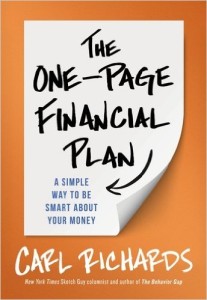The idea of creating a financial plan can be overwhelming as it often addresses a multitude of issues. Too often, people want to dive into which investment to buy or whether they need more insurance when thinking about their personal finances. Sadly, this is the result of our product-driven financial advice culture. The good news is that a real financial plan starts with questions that don’t require the purchase of any financial products.
Ask yourself, “why is money important to me?” This is simply another way of asking “what are your priorities?” Since I’ve never worked with anyone who had unlimited amounts of money, we have to prioritize how to use our limited financial resources. This can be difficult as it requires us to confront our hopes and dreams with reality (which is one reason why some people dismiss talk about money as not important to them).
Having a financial advisor to guide you in this process isn’t required (although it won’t shock you that I believe an advisor can do a better job of steering you around potential pitfalls and add some outside perspective). What is required is the commitment on your part to set aside time to think about your priorities.
One of my favorite books for starting this journey is Carl Richards’ “The One-Page Financial Plan” which guides you through a process of addressing these items through stories and his own experiences as a financial planner. Start with a blank sheet of paper and begin listing your goals. Perhaps it’s not having to work for the rest of your life or maybe sending a family member to college. For some people, it’s taking a trip or pursuing a different career.
through stories and his own experiences as a financial planner. Start with a blank sheet of paper and begin listing your goals. Perhaps it’s not having to work for the rest of your life or maybe sending a family member to college. For some people, it’s taking a trip or pursuing a different career.
Don’t worry about trying to be specific or quantifying how much money it will take to achieve the goal. In many situations, we find people cannot achieve everything they want or they have to scale back on some of their aspirations. However, in every situation, the process and clarity of this exercise outlines areas of shared goals between couples as well as personal goals that have been vaguely defined up until this point.
The focus of this first step is the conversation with yourself and then with your spouse about what’s important in your life. A real financial plan is not a 50-page document outlining the next thirty years of your life but rather the start of a process to clarify what’s important to you and to get you in the habit of revisiting whether you’re heading in the right direction. According to Richards, a simple index card outlining your major goals is a useful touchstone to make sure decisions today support moving you towards your future goals.
As published in the Racine Journal Times | May 5, 2016




